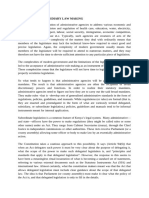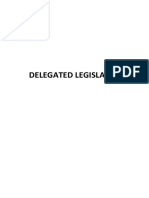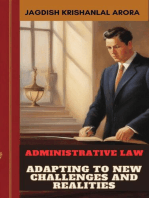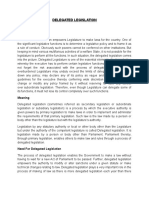Delegated Legislation
Delegated Legislation
Uploaded by
Lakshay GeraCopyright:
Available Formats
Delegated Legislation
Delegated Legislation
Uploaded by
Lakshay GeraOriginal Title
Copyright
Available Formats
Share this document
Did you find this document useful?
Is this content inappropriate?
Copyright:
Available Formats
Delegated Legislation
Delegated Legislation
Uploaded by
Lakshay GeraCopyright:
Available Formats
Delegated legislation
Delegated legislation refers to the process by which the legislative
authority of a government is delegated to a subordinate authority or body.
This delegated authority is usually given to administrative agencies, local
government bodies, or other organizations to make rules, regulations, and
by-laws that have the force of law.
Delegated legislation is often used to allow for more efficient and effective
regulation of complex areas, where the legislative process may be too
slow or cumbersome to keep up with changing circumstances. For
example, delegated legislation may be used to regulate technical areas
such as health and safety, environmental protection, or taxation.
The powers and limits of delegated legislation are usually set out in the
constitution or other governing laws. These limits may include restrictions
on the types of rules that can be made, the scope of their application, and
the procedures that must be followed in making and enforcing them.
Delegated legislation is subject to the same legal requirements and
standards as legislation made by the legislative authority. This includes
requirements for procedural fairness, accountability, and the protection of
fundamental rights and freedoms.
Delegated legislation is often reviewed by courts or other bodies to ensure
that it complies with the legal framework within which it is made. If a
court finds that delegated legislation is inconsistent with the constitution
or other laws, it may declare it invalid or unconstitutional.
Delegated legislation is necessary for several reasons:
1. Efficiency: Delegated legislation allows for a more efficient law-making
process, as it allows technical and detailed rules and regulations to be
made quickly by those with expertise in the subject matter. This helps to
ensure that laws are up-to-date and reflect the needs of society.
2. Flexibility: Delegated legislation provides flexibility to the primary law-
making authority, allowing it to delegate responsibility to other bodies to
make laws in areas where there may be frequent changes or where
detailed knowledge is required. This allows for greater adaptability to
changing circumstances and avoids the need for frequent amendments to
primary legislation.
3. Specialization: Delegated legislation allows for specialized bodies to make
rules and regulations in their areas of expertise, such as healthcare or
education. This ensures that laws are made by those with the necessary
knowledge and experience, resulting in better-quality legislation.
4. Public consultation: Delegated legislation often involves a process of
public consultation, providing an opportunity for stakeholders to provide
feedback on proposed rules and regulations. This helps to ensure that the
laws made are in the public interest and reflect the needs of society .
Delegated legislation can be classified in various ways, including:
1. Statutory Instruments: These are the most common type of delegated legislation and are
made by government ministers or other bodies empowered by the primary legislation.
Statutory Instruments are often used to provide details or regulations on how a particular Act
of Parliament should be implemented.
2. Orders in Council: These are made by the Privy Council, which is a group of advisors to the
monarch. Orders in Council are used for matters that are of great importance, such as national
security, and are often made in response to emergencies.
3. Bylaws: These are made by local authorities, such as councils or local boards, to regulate
matters in their local areas. Bylaws are often used for issues such as parking restrictions,
noise levels, and waste management.
4. Rules and Regulations: These are made by government agencies, such as the Financial
Conduct Authority or the Health and Safety Executive. Rules and regulations are used to
implement the primary legislation in a specific sector or area.
5. Codes of Practice: These are issued by government bodies, professional associations, or
other organizations to provide guidance on how to comply with specific legislation. Codes of
practice are often used in areas such as health and safety, employment, and environmental
protection.
Constitutionality of delegated legislation
Delegated legislation refers to laws or regulations made by administrative
agencies, under authority delegated to them by the legislative branch of
government. The question of the constitutionality of delegated legislation
depends on the specific circumstances and the legal framework of the
country in question.
In general, delegated legislation must comply with the constitution of the
country, which sets out the fundamental principles and rules governing
the exercise of governmental power. In many countries, the constitution
provides specific limits on the power of administrative agencies to make
laws or regulations, such as requirements for public notice and comment,
or limitations on the scope of delegated authority.
The constitutionality of delegated legislation may also depend on the
extent of the delegation of legislative power from the legislative branch to
the administrative agency. In some cases, the delegation of power may be
so broad that it violates the separation of powers doctrine, which seeks to
prevent any one branch of government from accumulating too much
power.
Courts may be called upon to decide whether a particular instance of
delegated legislation is constitutional, and may consider factors such as
the nature and scope of the delegated power, the procedural safeguards
in place, and the impact of the delegated legislation on individual rights
and interests. Ultimately, the question of the constitutionality of delegated
legislation depends on the specific circumstances of each case and the
legal framework in which it is considered.
Cases on constitutionality of delegated legislation
There have been numerous cases throughout history in various countries
that have addressed the constitutionality of delegated legislation. Here
are a few examples from different legal systems:
1. United States - Whitman v. American Trucking Assns., Inc. (2001) This
case concerned the constitutionality of an Environmental Protection
Agency (EPA) regulation that set new air quality standards for particulate
matter. The Supreme Court held that the regulation was unconstitutional
because it delegated too much legislative power to the EPA without
providing clear guidance to the agency.
2. United Kingdom - R (Anderson) v. Secretary of State for the Home
Department (2002) This case involved a challenge to a regulation made
by the Secretary of State that restricted the right of prisoners to receive
certain publications. The Court of Appeal held that the regulation was
unconstitutional because it was not made within the scope of the powers
delegated to the Secretary of State by Parliament.
3. India - L. Chandra Kumar v. Union of India (1997) This case concerned the
constitutionality of a law that allowed administrative tribunals to
adjudicate disputes in place of regular courts. The Supreme Court held
that the law was constitutional because it did not completely deprive the
jurisdiction of regular courts and provided sufficient safeguards to ensure
fairness.
4. Australia - Coco v. The Queen (1994) This case involved a challenge to a
regulation made by the Governor-General under the Customs Act 1901
(Cth) that prohibited the importation of a certain substance. The High
Court held that the regulation was unconstitutional because it conferred
too much legislative power on the executive branch without adequate
parliamentary control.
These cases illustrate some of the key issues that arise when considering
the constitutionality of delegated legislation, including the scope of
delegated power, the need for clear guidance and procedural safeguards,
and the balance between executive and legislative authority.
You might also like
- Admin Law Exam ApproachDocument12 pagesAdmin Law Exam Approachsetareh2167% (6)
- LAWDocument6 pagesLAWek4576008No ratings yet
- SubmissionDocument29 pagesSubmissionprince bhaiNo ratings yet
- Admin Research PaperDocument12 pagesAdmin Research PapermaitreyaarumugamNo ratings yet
- Procedural Safeguards Against Delegated Legislation NotesDocument4 pagesProcedural Safeguards Against Delegated Legislation NotesZerobalance DhanushNo ratings yet
- Procedural Safeguards Against Delegated Legislation Notes 1Document5 pagesProcedural Safeguards Against Delegated Legislation Notes 1Zerobalance DhanushNo ratings yet
- Delegated Legislation - Administrative Law - Legal Bites - Law and BeyondDocument4 pagesDelegated Legislation - Administrative Law - Legal Bites - Law and BeyondNavin kumarNo ratings yet
- 21010224005-Administrative LAWDocument7 pages21010224005-Administrative LAWAbhishek KumarNo ratings yet
- Text 7Document4 pagesText 7bhavikaarathiiNo ratings yet
- Administrative LawDocument16 pagesAdministrative LawPiku NaikNo ratings yet
- Delegated LegislationDocument6 pagesDelegated Legislationsreedevi sureshNo ratings yet
- Delegated Legislation QnaDocument7 pagesDelegated Legislation QnaMaggie CMQNo ratings yet
- Chapter 17 - Administrative Law Chapter OverviewDocument7 pagesChapter 17 - Administrative Law Chapter OverviewLexyNo ratings yet
- Delegated Legislation Law & SocietyDocument20 pagesDelegated Legislation Law & SocietyMuhammad AbduAllahNo ratings yet
- Admin LawDocument15 pagesAdmin Lawstuti ghalayNo ratings yet
- Adminstration LAW ConciseDocument22 pagesAdminstration LAW ConciseKrupa Diamond DandNo ratings yet
- Judicial Control Over Deleated Legislation in IndiaDocument8 pagesJudicial Control Over Deleated Legislation in Indiakhushigupta.kg246No ratings yet
- AL Module 2. Delegated LegislationDocument29 pagesAL Module 2. Delegated LegislationAaditya KesariNo ratings yet
- Introduction To Administrative Law LDocument46 pagesIntroduction To Administrative Law LPeter GriffinNo ratings yet
- Chanakya National Law University: Project Report of 6Th Semester 2014 Administrative LawDocument31 pagesChanakya National Law University: Project Report of 6Th Semester 2014 Administrative LawashwaniNo ratings yet
- Administrative LawDocument8 pagesAdministrative LawtairupaskidNo ratings yet
- Understanding Administrative Law: Fourth EditionDocument30 pagesUnderstanding Administrative Law: Fourth EditionNikunj PatelNo ratings yet
- Delegated Legislation and Its ControlDocument10 pagesDelegated Legislation and Its ControlHeracles PegasusNo ratings yet
- 4delegated Law MakingDocument4 pages4delegated Law MakingOduor Otisjnr.ENo ratings yet
- Administartive LawDocument8 pagesAdministartive Lawcharless madwagoNo ratings yet
- National Law Institute University: A Project OnDocument15 pagesNational Law Institute University: A Project OnDheeresh Kumar DwivediNo ratings yet
- Administrative lawDocument34 pagesAdministrative lawKhushi JangidNo ratings yet
- Musheer Ahmad..Document7 pagesMusheer Ahmad..The Learning PortalNo ratings yet
- Admin Law Unit 1Document4 pagesAdmin Law Unit 1akansha gulatiNo ratings yet
- Prakaash MDocument11 pagesPrakaash MFarhin KhanNo ratings yet
- Yash ChoudharDocument13 pagesYash ChoudharTHAKUR SAHABNo ratings yet
- 4delegated Law MakingDocument4 pages4delegated Law MakingLorraine ManmanNo ratings yet
- DelegatedDocument5 pagesDelegatedashraf hamiduNo ratings yet
- Administrative Law: (Document Title)Document6 pagesAdministrative Law: (Document Title)Krishnakumar RNo ratings yet
- 2.1 Delegated Legislation: Black S Law DictionaryDocument9 pages2.1 Delegated Legislation: Black S Law DictionaryAdyasha RoutNo ratings yet
- Administrative LawDocument10 pagesAdministrative LawShashankNo ratings yet
- Subsidiary LegislationDocument2 pagesSubsidiary LegislationAcha SaingNo ratings yet
- Legal ResearchDocument21 pagesLegal ResearchLeomard SilverJoseph Centron Lim100% (1)
- LD Module 1Document26 pagesLD Module 1xakij19914No ratings yet
- Abstract 1Document13 pagesAbstract 1debipinky899No ratings yet
- Administrative LawDocument10 pagesAdministrative LawmhiityyNo ratings yet
- Administrative Law Assignment - IiDocument13 pagesAdministrative Law Assignment - IiNEHANo ratings yet
- Section 02Document8 pagesSection 02info.mueluxNo ratings yet
- Admin Law NotesDocument55 pagesAdmin Law NotesShikhar SanadayaNo ratings yet
- Admin Assignment 2Document2 pagesAdmin Assignment 2220060201025.ishanNo ratings yet
- Delegated LegislationDocument3 pagesDelegated LegislationSunbal LashariNo ratings yet
- Ios U1 U2 U3 U4: Classification of Statutes On The Basis of DurationDocument35 pagesIos U1 U2 U3 U4: Classification of Statutes On The Basis of Durationriagupta503No ratings yet
- Delegated Legislation: I) Certain Emergency Situations May Arise Which NecessitateDocument13 pagesDelegated Legislation: I) Certain Emergency Situations May Arise Which NecessitatevishalNo ratings yet
- Watershed and Indian Position: "Watershed"in Administrative LawDocument35 pagesWatershed and Indian Position: "Watershed"in Administrative LawvineetNo ratings yet
- Judicial ReviewDocument41 pagesJudicial Reviewbeaconlaw254No ratings yet
- IOS DraftDocument13 pagesIOS DraftAyashkant ParidaNo ratings yet
- Administrative Law Chapter FiveDocument12 pagesAdministrative Law Chapter Fivenigussetarekegn74No ratings yet
- AL KaushDocument9 pagesAL KaushWork 2018No ratings yet
- Delegated Legislation: Dhaka International UniversityDocument13 pagesDelegated Legislation: Dhaka International UniversityHasanat ParvezNo ratings yet
- ADL2601 Full Exam May2024Document9 pagesADL2601 Full Exam May2024sabelochiliza10No ratings yet
- Adm Law Final Test SummarizationDocument2 pagesAdm Law Final Test Summarization6ghsxtp77pNo ratings yet
- Delegated LegislationDocument18 pagesDelegated Legislationnouf khan100% (1)
- Administrative Law Reviewer - Atty. Gallant Soriano (Habana Notes)Document10 pagesAdministrative Law Reviewer - Atty. Gallant Soriano (Habana Notes)Arvin Figueroa100% (1)
- Out of Bounds and Out of Control: Regulatory Enforcement at the EPAFrom EverandOut of Bounds and Out of Control: Regulatory Enforcement at the EPANo ratings yet
- Social Security LigislationDocument5 pagesSocial Security LigislationDIVYANSHU SHEKHARNo ratings yet
- Aligarh Muslim University: Malappuram Centre, KeralaDocument13 pagesAligarh Muslim University: Malappuram Centre, KeralaVaibhav ChaudharyNo ratings yet
- Section A.2-Delegated LegislationDocument28 pagesSection A.2-Delegated LegislationJASNOORNo ratings yet
- Amisha Prakash Administrative Law 2005Document38 pagesAmisha Prakash Administrative Law 2005Amisha PrakashNo ratings yet
- Introduction: What Is The Doctrine: CONSTITUTIONAL LAW: Doctrine of Occupied FieldDocument3 pagesIntroduction: What Is The Doctrine: CONSTITUTIONAL LAW: Doctrine of Occupied FieldAnanyaNo ratings yet
- Delegated LegislationDocument6 pagesDelegated LegislationAkshay BhasinNo ratings yet
- The Legal System of Bangladesh by Md. Abdul Halim - Chapter 10 - 19 & AppendixDocument264 pagesThe Legal System of Bangladesh by Md. Abdul Halim - Chapter 10 - 19 & AppendixMD. Dinan WahedNo ratings yet
- Doctrine of Excessive LegislationDocument4 pagesDoctrine of Excessive LegislationAkshansh BhadouriyaNo ratings yet
- Project of Admin Law On The Topic Delegated - Legislation - in - IndiaDocument21 pagesProject of Admin Law On The Topic Delegated - Legislation - in - IndiaAmitesh Tejaswi100% (1)




































































